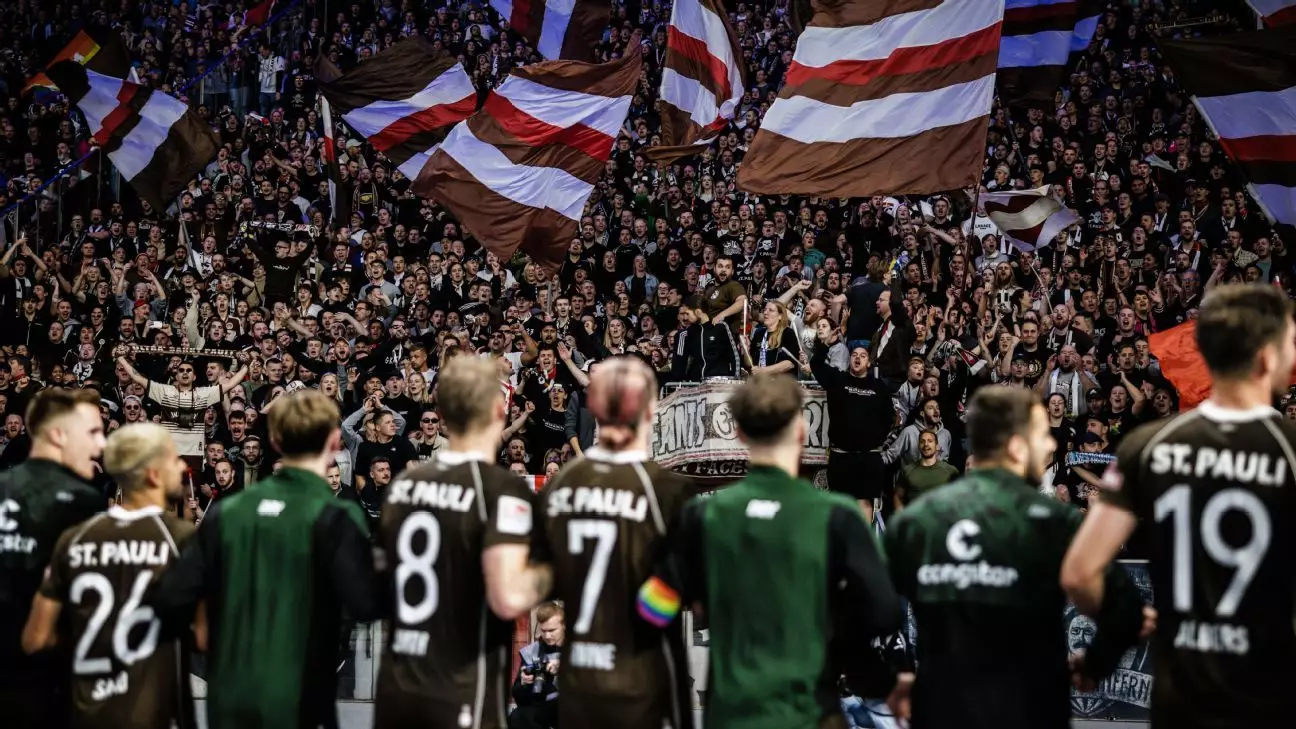In many cultures, there exists a prevailing belief that sport and politics should remain separate, an idea often echoed by friends and commentators in both American and British circles. However, a closer examination of German football, particularly the case of FC St. Pauli, reveals that this perspective fails to capture the reality of the sport’s role in society. In Germany, football serves not merely as entertainment but as an avenue for community expression and political statement. Clubs like St. Pauli embody a commitment to social values, directly reflecting the political and social landscape of their surroundings.
St. Pauli, a club that returned to the Bundesliga after a 13-year absence, stands as a testament to how football can act as a microcosm for social movements. Situated in Hamburg, the club is deeply intertwined with its locale, particularly the infamous Reeperbahn district — an area known for its vibrant, unconventional culture. St. Pauli’s founding principles are steeped in leftist ideology, making them a distinctive presence in a world increasingly dominated by corporate interests. This ethos is embodied in their proactive stances against fascism, racism, and other forms of discrimination, thereby attracting fans who resonate with these values.
The historical roots of St. Pauli’s political activism date back to the 1980s. Arriving in Hamburg as a student during this era, the club’s supporters spoke of their mission to advocate for socio-political issues like homelessness and squatting rights. Then, as now, St. Pauli emerged not just as a football club but as a beacon of social activism and change, contrasting sharply with the rampant hooliganism associated with far-right ideologies in European football. The club witnessed a dramatic surge in its fanbase during this period, as their identity became synonymous with alternative culture and subversive politics.
The design of their emblem—featuring the iconic skull and crossbones—was introduced in the 1990s, an initiative driven by local punk music culture. Such creativity speaks volumes about the club’s unique branding, turning St. Pauli into a cultural phenomenon that captures the imagination of fans well beyond the nuances of football. Today, attending a match at their Millerntor stadium is not just about the game; it is a multisensory experience characterized by music and a palpable sense of community.
The atmosphere at Millerntor is nothing short of electrifying; the sound of AC/DC’s “Hell’s Bells” heralds the players’ entrance, while Blur’s “Song 2” marks the club’s goals, setting a festive tone that transcends the sport itself. Fans swarm to the stadium, not just to witness the on-field drama but to be part of an extraordinary social celebration. The allure of St. Pauli is such that non-German fans have traveled long distances to experience a match, claiming it to be a refreshing antidote to the sterile, corporate nature of modern football.
As St. Pauli faces formidable opponents like Bayern Munich, memories of historical matches resurface. Notably, a victory against Bayern during a dismal season epitomizes the club’s resilient spirit. Even as St. Pauli coped with relegation and financial struggles, their passion for the game and commitment to their community has only deepened, cementing their position in the hearts of their supporters.
Currently, St. Pauli is on the verge of launching their innovative cooperative model, which places ownership in the hands of their supporters. This structure, where fans can purchase shares at fixed prices yet retain equal voting rights, buckles under the trend of billionaire owners dominating the sport. The cooperative model seeks to ensure not just financial stability but aligns with the club’s foundational principle of equality. This initiative empowers fans to influence club decisions directly, promoting sustainable growth reflective of collective values rather than profit motives.
Furthermore, this cooperative system dovetails with the club’s broader mission to remain rooted in its community. St. Pauli operates under the 50+1 rule, safeguarding the club from takeover by wealthy investors who may not share the same priorities. In a world where many clubs are increasingly viewed as commodities, St. Pauli stands firm in its principles, fostering a sense of belonging and fair representation among its members.
As St. Pauli gears up for their match against Bayern Munich, their story highlights the unique blend of sport and advocacy that permeates German football. In a political climate often fragmented by polarization, St. Pauli offers a composite vision of unity and community engagement that many might find appealing. For millions worldwide, Saturday’s match promises not just a display of athleticism but an insight into a vibrant culture that refuses to be categorized, compelling observers to rethink the often-dismissed relationship between sport and social activism. This is more than a football club; it’s a movement, and it’s one that resonates deeply with its supporters and those who value the transformative power of sport within society.

